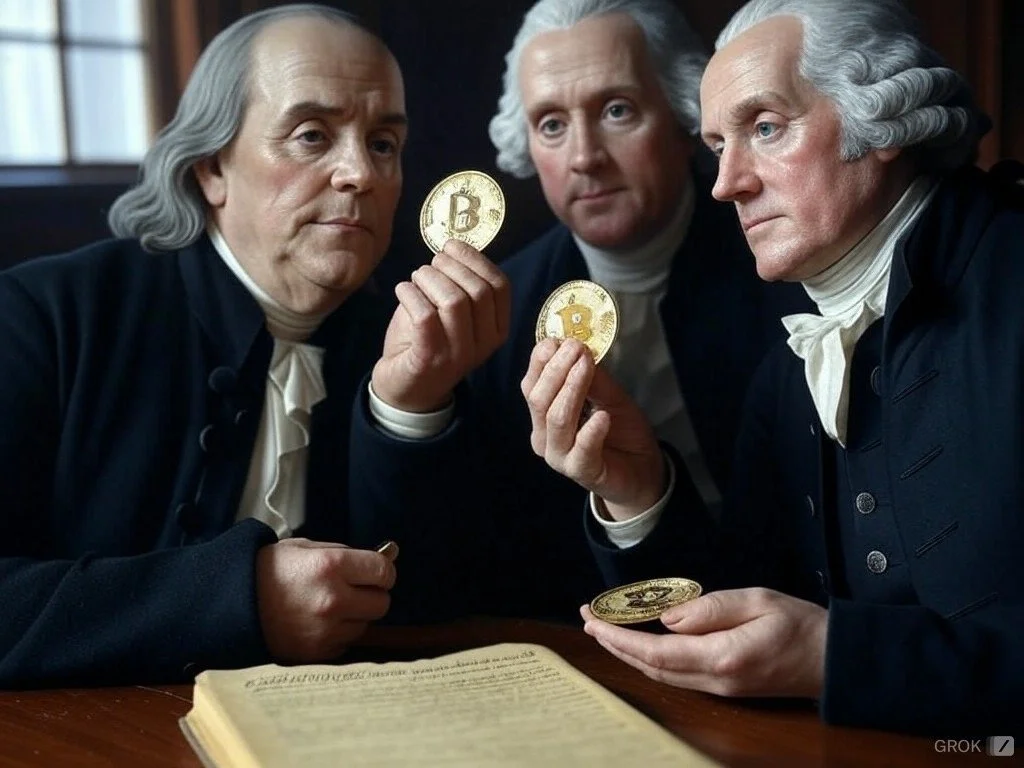The Forefathers would have been pro-Bitcoin.
The Forefathers Would Have Been Pro-Bitcoin
When we look back at the foundational principles upon which the United States was built, it's not a stretch to argue that the forefathers would have been proponents of Bitcoin. Here's why:
1. Distrust of Centralized Power:
The Founding Fathers had a profound distrust of centralized power, especially when it came to financial control. The very existence of the U.S. Constitution was partly in response to the issues of centralized financial authority under British rule. Bitcoin, with its decentralized nature, aligns perfectly with this philosophy. There's no single entity controlling Bitcoin; its protocol is maintained by a network of nodes, echoing the checks and balances the founders envisioned.
2. Freedom and Privacy:
Privacy in financial transactions was something the forefathers would have valued, given their experiences with intrusive British policies like the Stamp Act. Bitcoin offers a level of anonymity and privacy in transactions that traditional banking does not. While not perfectly anonymous, the pseudonymity of Bitcoin transactions would resonate with the founders' desire for personal freedoms against government overreach.
3. Sound Money:
Many of the Founding Fathers, including Thomas Jefferson and Alexander Hamilton, debated the nature of money. They favored systems where currency could not be arbitrarily manipulated by government decree. Bitcoin's fixed supply of 21 million coins counters the inflationary policies that can be enacted by central banks. In this way, Bitcoin can be seen as a modern embodiment of "sound money" principles that were contemplated during the founding of the nation.
4. Innovation and Progress:
The forefathers were not just looking to escape from tyranny; they were forward-thinkers in many regards, advocating for innovation and scientific progress. Bitcoin represents a significant leap in financial technology - a new way to think about and handle currency. The founders, who were known for their embrace of enlightenment ideas, might have seen Bitcoin as an innovative step towards a more perfect union of financial sovereignty.
5. The Right to Property:
One of the key tenets of the U.S. Constitution is the protection of property rights. Bitcoin gives individuals the power to own and secure their wealth without intermediaries. The ability to hold and transfer value without the need for a third-party intermediary would have been appealing to those who cherished the sanctity of personal property.
6. Against Financial Tyranny:
The American Revolution was, in part, a rebellion against financial tyranny. Bitcoin offers an escape from the potential for government or banking system abuse, providing a tool for individuals to maintain financial sovereignty. This aspect of Bitcoin could be seen as a digital echo of the Boston Tea Party - a stand against unfair financial systems.
Conclusion:
While we can't know definitively how the forefathers would have viewed Bitcoin, the principles upon which they built the nation suggest they might have seen it as a tool in alignment with their vision of liberty, privacy, and economic freedom. In a world where Bitcoin challenges the status quo of financial systems, it's not hard to imagine these visionaries being intrigued by, and possibly supportive of, this cryptocurrency.
This isn't to say they would endorse every aspect of how Bitcoin is used today, but the core values embedded in Bitcoin technology seem to resonate with the ideals of life, liberty, and the pursuit of happiness - ideals that were at the heart of the American experiment.
This article seeks to blend historical context with modern technology, presenting an argument that the philosophical underpinnings of Bitcoin align with the values of America's founders.

